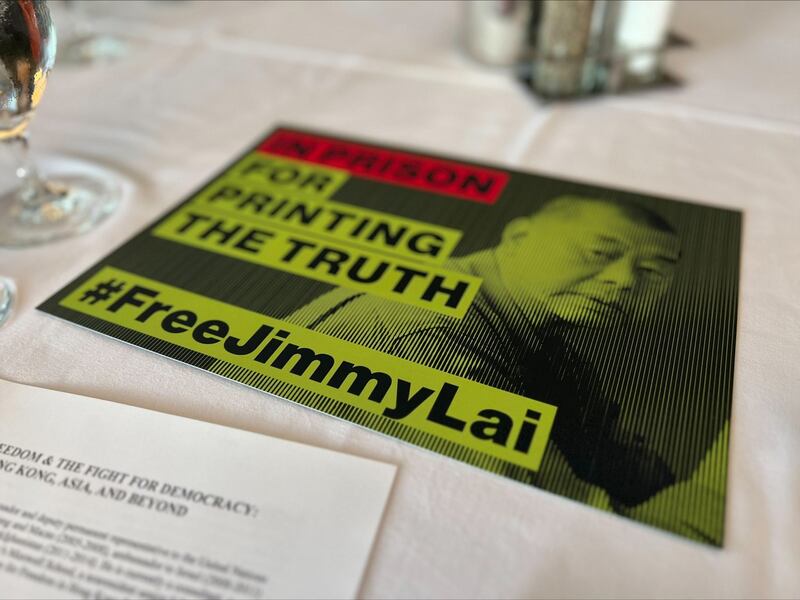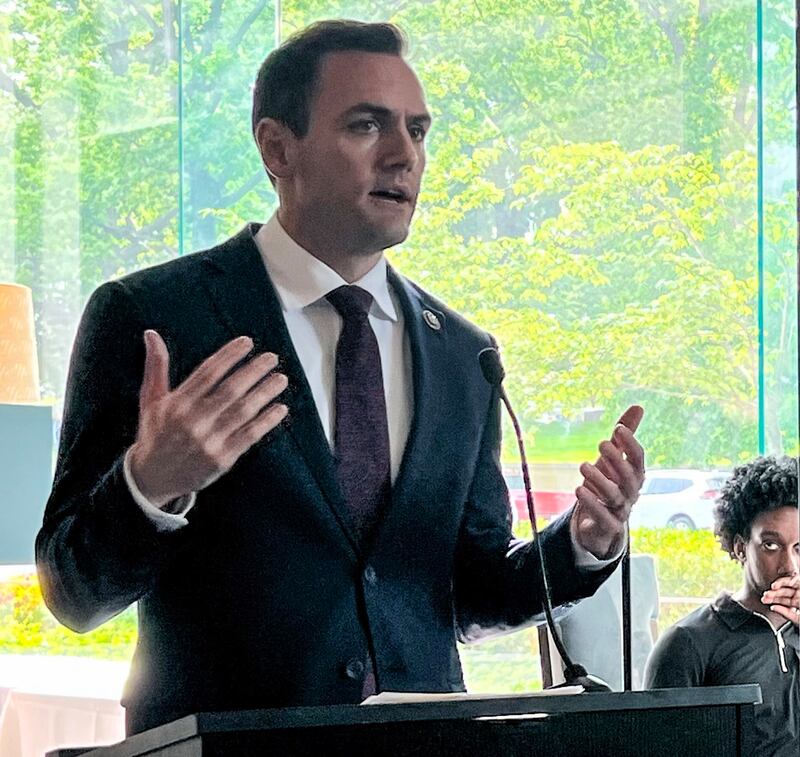The suppression of Hong Kong's promised freedoms under Chinese rule should serve as a warning to the international community that Beijing will continue to export its authoritarian rule far beyond its borders, says the son of jailed Hong Kong media magnate Jimmy Lai.
"Hong Kong is a litmus test for how China views the world," Sebastien Lai told journalists during a visit to Washington. "If they aren't willing to respect those freedoms in Hong Kong, then the long arm of China is basically everywhere."
"If they're not willing to do that in Hong Kong, with all the economic benefits that come with, they're not willing to do that in the U.S., in the U.K., in Ireland,” he said.
“You see that with the secret police stations," Lai said. "It really shows how they view cooperation with another state; it doesn't seem like they want friendly cooperation with democratic countries."
Jimmy Lai's Next Digital media empire and its flagship Apple Daily newspaper were forced to close amid a national security investigation, and he is still awaiting trial on charges of "collusion with a foreign power" and others linked to "seditious publications," as the authorities move to disqualify his British barrister.
International press freedom groups say the ruling Communist Party under supreme leader Xi Jinping has " gutted" press freedom in the formerly freewheeling city amid an ongoing crackdown on dissent in the wake of the 2019 protest movement.
Hong Kong journalists who fled the city after Beijing imposed a national security law from July 1, 2020, continue to campaign for press freedom for the city from overseas, but say they are constantly targeted for transnational repression by agents and supporters of the Chinese state, including secret Chinese police stations in a number of countries.
‘Shine a light’
Lai told RFA Cantonese that he intends to keep speaking out to "shine a light" on the unfolding crackdown on freedom of speech that saw the jailing of his father and the closure of his flagship Apple Daily newspaper following raids by the national security police.
"What I want to achieve is for the world to see that both my father and all these other political prisoners are standing trial right now," he said.

"The Hong Kong government keeps claiming that there is still freedom of the press and rule of law with all of its "Hello Hong Kong" propaganda, which is pretty despicable, because that's pretty clearly not the case," Lai said. "They're saying one thing, while doing another, so the world needs to know this."
He also warned any investors or companies looking to invest or expand operations in Hong Kong to look at the national security investigation of the Apple Daily as a cautionary tale.
"The Apple Daily headquarters was over five floors. At its peak, we had a newsroom of over 900 people," Lai said, adding: "They raided it twice. The first time, they sent 200 people there."
"Basically, 200 police rushed in, grabbed laptops, and made sure that nobody could work, nobody could touch any devices. The second time [they sent] 500 people," he said.
"So, if you want to know what could happen to any business in Hong Kong ... that is a very good picture to look at before you make any decisions in terms of investments."
He said the risk of charges under a national security law imposed on the city by Beijing in the wake of the 2019 mass protests against diminishing freedoms means that the cost of doing business in the city has now risen sharply.
"The ability, like in Western countries, to speak out on anything you want has been massively limited," Lai said. "It's all well and great if you're going there for a holiday or whatnot, but in terms of a financial center ... you at least need the rule of law and some semblance of free speech, and that's not the case there."
Trying to lure talent
Lai's comments came as the Hong Kong authorities try to boost investor interest in Hong Kong, seeking to attract fresh talent and visitors with new visa schemes and free plane tickets in a bid to counteract a mass exodus of middle-class and wealthy people in the wake of the national security law crackdown.
"It's just a very dark time for a financial center," Lai said. "How long can you keep being a financial center if people aren't allowed to speak up ... or if people are jailed for liking social media posts, and unfair sentences are handed out left and right?"

"My father got five years, nine months ... on a commercial charge ... the first time anybody has gone to jail for a lease violation," he said. "The fact that they used this to attack my father shows how much Hong Kong has gone down as a place to do business, as a place to live, as a place to work."
Lai, who is a British national like his father, said the United States had been much tougher on China than Britain.
"The U.K. government has been incredibly weak,” he said in comments reported by Reuters as Britain's Minister for Investment Dominic Johnson said he held a series of meetings with government officials and executives in Hong Kong this week.
"It's very sad to see a democratic government being afraid – or asking permission even – to speak on behalf of one of its citizens that is in prison for freedom of speech."
U.S. Congressman Mike Gallagher, chair of the House of Representatives select committee on China’s Communist Party, meanwhile hit out at the Vatican for not standing up for Jimmy Lai, who, like him, is a Catholic.
"The silence from the Vatican on China’s human rights abuses and Jimmy’s case, in particular, is deafening," Reuters quoted him as saying, adding that the Vatican's Washington embassy did not immediately respond to a request for comment.
Translated by Luisetta Mudie. Edited by Malcolm Foster.
